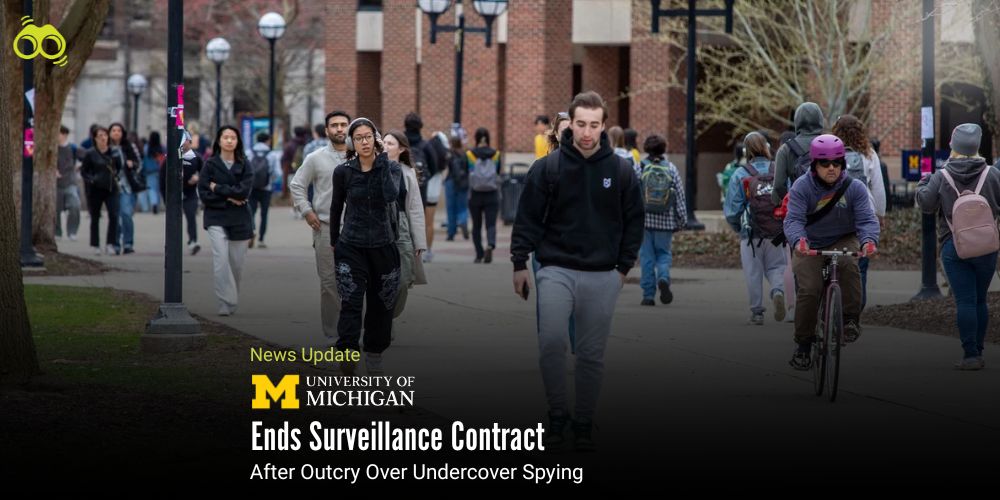Surveillance Controversy Sparks Debate: University of Michigan Drops Security Firm
Academic Freedom Under Scrutiny: Michigan University Cuts Ties with Private Investigators
The University of Michigan has come under intense scrutiny following revelations that undercover investigators, hired through a private security firm, had been monitoring pro-Palestinian student groups for an extended period. The controversy, which gained traction after a report by The Guardian, led to widespread criticism from students, faculty, and the broader public. Furthermore, video footage depicting an unsettling interaction between an investigator and a student exacerbated concerns over surveillance practices on campus.
In response to the backlash, University President Domenico Grasso addressed the issue in an email to students and faculty, acknowledging that an employee of the contracted security firm had acted in a manner inconsistent with the university’s values and directives. As a result, the university decided to terminate its contract with the private security provider and announced that it would no longer engage external vendors for plainclothes security on campus.
Moreover, reports indicate that the investigators were linked to City Shield, a Detroit-based security firm whose footage was used by Michigan prosecutors to charge and detain students. It was revealed that between June 2023 and September 2024, the University of Michigan paid City Shield’s parent company, Ameri-Shield, at least $800,000 as part of a broader expenditure exceeding $3 million on consultants and security in response to protests against Israel’s actions in Gaza. Consequently, the university has faced sharp criticism for its heavy-handed approach to student activism.
Additionally, according to The Guardian, dozens of private investigators had been monitoring student protesters on and off campus. Both video footage and student accounts disclosed troubling behaviour, with reports indicating that some investigators engaged in confrontational tactics, including cursing, issuing threats, and in one instance, allegedly driving a car at a student. Equally concerning, students reported incidents where investigators resorted to deceptive practices. One investigator, caught on video, falsely accused a student of attempted robbery while pretending to have disabilities. The same individual, who at times acted deaf and mute, was recorded making offensive remarks, including labelling a student a “special needs student.”
Reacting to the outrage, University President Domenico Grasso denounced the investigators' actions as “disturbing, unacceptable, and unethical,” stressing that such behaviour would not be tolerated. His remarks followed a wave of condemnation from students, faculty, and social media users. Grasso explained that the investigators were initially hired to support campus safety and emergency response; however, he underscored that no individual should be targeted based on their beliefs or affiliations.
Meanwhile, PhD student Katarina Keating, who was among those surveilled, welcomed the termination of the contract but criticised the university’s denial of targeting pro-Palestinian groups, describing it as “insulting.” Available evidence, she asserted, suggests that only pro-Palestinian activists were subjected to surveillance. Furthermore, Keating urged the University of Michigan to remove all hired security personnel, not merely undercover agents, and to lift campus bans on students involved in pro-Palestinian protests. Some of the evidence gathered by the investigators was reportedly used by Michigan Attorney General Dana Nessel to charge students with violating bond conditions from prior arrests. Notably, one student was jailed for four days before additional charges were dropped, though City Shield, the security firm involved, did not respond to media inquiries.
Keating also criticised the university president’s email for focusing too narrowly on the actions of one investigator, arguing that, irrespective of procedural adherence, the decision to hire private contractors to surveil students remained fundamentally troubling. Ultimately, the university’s decision to sever ties with the private security firm signals a response to public outcry, though broader concerns regarding student surveillance and institutional accountability persist.
Editor's Note
The recent revelations about the University of Michigan spying on pro-Palestinian student groups highlight a serious breach of trust between the university and its students. Universities are meant to be places where students can speak freely, share ideas, and protest peacefully. But in this case, security efforts crossed the line into intimidation, putting students' right to protest at risk. Ending the contract with the security firm was an important step, but it doesn’t remove the university’s responsibility. The use of aggressive tactics and the focus on specific student groups raise major ethical questions. If universities use such methods in the name of safety, it could seriously damage the idea of academic freedom.
Skoobuzz believes that the University of Michigan, and any other university in a similar situation, should think carefully about what they’ve done and focus on protecting student rights. A university should be a place where students feel free to speak, protest, and share ideas openly. Spying on students, especially certain groups, creates fear instead of encouraging learning.














0 Comments (Please Login To Continue)